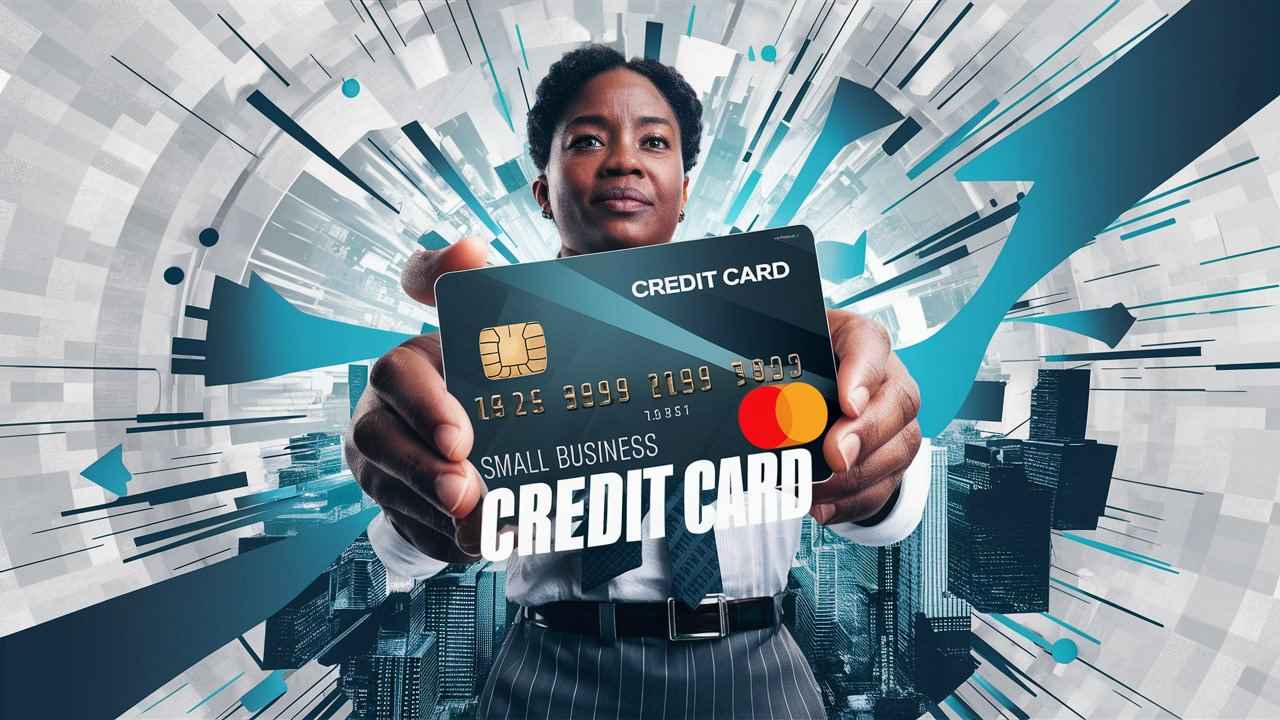Introduction to Small Business Credit Cards
In today’s fast-paced economy, having a Small Business Credit Card can mean the difference between thriving and simply surviving. Many small business owners, freelancers, and side hustlers often wonder if this tool is worth the hype. It isn’t just about convenience💳this card can open up avenues for financial growth, improve cash flow, and streamline expenses. Let’s dive into what makes a Small Business Credit Card a unique asset and why it might be exactly what your business needs.

Defining the Small Business Credit Card
Is it Different from a Personal Credit Card?
Absolutely, yes! A Small Business Credit Card might look like your personal card on the outside, but it operates in a whole new financial league. Unlike personal credit cards, business cards are structured to handle higher spending volumes and provide perks that cater directly to business expenses💳think discounts on office supplies, software, and even travel perks. The most crucial distinction? It builds credit for your business, not you personally, allowing your company to establish a financial profile separate from your own.
Why Your Business Needs Its Own Card
Why, indeed! For starters, having a dedicated Business Credit Card simplifies your accounting. Expenses are in one place, allowing you to clearly see what’s going out for the business without having to dig through personal transactions. It’s also a boon come tax time, providing an organized record of deductible expenses. More than just clarity, though, a Small Business Credit Card builds business credit, which can open the doors to better financing options and lower interest rates down the road.💳

The Real Benefits of a Small Business Credit Card
Building Your Business Credit from the Ground Up
Your Small Business needs credit to grow, and a business credit card can be your foot in the door. With a solid business credit profile, you can access larger loans, better lease terms, and even more advantageous vendor contracts. Paying off your business card in full and on time will elevate your credit score over time, building a financial reputation that lenders and vendors respect.
Maximizing Cash Flow and Smoothing Expenses
Cash flow can be a major hurdle for small businesses, especially in the early stages. With a Credit Card, you can bridge the gap when invoices are delayed or when you have large upfront costs. Rather than waiting for cash to flow in, your card allows you to cover immediate needs, ensuring the business never skips a beat.💳
Saving Big with Rewards and Cash Back
Imagine getting money back for every purchase you make on behalf of your business. With a Small Business Credit Card, you can! From cash back on routine expenses like office supplies and gas to travel rewards and exclusive perks, these rewards are tailored for maximum business impact.

Who Qualifies for a Small Business Credit Card?
Freelancers, Side Hustlers, and Small Business Owners Unite
One of the best-kept secrets is that you don’t need to have a storefront or employees to qualify for a Small Business Credit Card. If you freelance, consult, or operate a small business from your living room, you’re eligible. These cards aren’t just for big-name corporations; they’re for anyone with a legitimate business need, from full-time entrepreneurs to side hustlers.💳
Do You Really Need an EIN?
Not necessarily! While an EIN (Employer Identification Number) is helpful, especially for incorporated businesses, many card issuers accept a Social Security Number (SSN) for sole proprietors and freelancers. So, if you’re just starting out, an EIN isn’t a deal-breaker💳it’s your business activities and creditworthiness that truly matter.

How to Apply for a Small Business Credit Card
Preparing Your Business and Personal Info
Be ready to provide information about both your business and personal finances. Basic business details, annual revenue, and time in operation are often required. If your business is new, be prepared to show strong personal credit to qualify.
Choosing the Right Card for Your Business Needs
With so many options, choosing the perfect card is no small task. Look for one that aligns with your biggest expense categories💳—whether that’s travel, office supplies, or client entertaining. Some cards offer higher rewards in specific categories, which can significantly impact your bottom line.

Credit Limits and How They Work for Small Businesses
How Credit Limits Differ from Personal Cards
Credit limits on Business Credit Cards are often higher than personal ones, which allows businesses to cover more substantial expenses. However, higher limits come with increased responsibility; spending beyond your means could lead to debt challenges down the line.
What to Do When Your Limit Isn’t Quite Enough
If your business needs more flexibility, you can often request a credit limit increase. If the issuer can’t grant it, consider adding a secondary business card to spread out purchases and prevent maxing out your primary card.💳
Understanding APR and Interest Rates
The Ups and Downs of Business Credit Card Rates
Business credit card APRs can fluctuate significantly based on the economy and the card type. It’s crucial to understand that high APRs can lead to steep interest costs if you carry a balance. Ideally, you’ll use the card for short-term financing and pay it off monthly.
Low APR Cards: Are They Worth It?
Low APR cards can be a godsend for businesses planning to carry a balance periodically. They can save you substantial interest costs, though they often lack the rewards or perks of higher APR cards. Consider what’s more important: lower interest or higher rewards.

Perks, Rewards, and Hidden Bonuses
Cash Back on Office Supplies? Yes, Please!
Many business cards provide cash back on supplies, tech purchases, and even dining💳perfect for those team lunches. Over time, this cash back can add up to a significant savings buffer.
Travel Perks and Other Surprising Benefits
If your business involves travel, look for cards offering travel insurance, lounge access, and discounts on flights. These perks are not only convenient but can also reduce your out-of-pocket costs.
Bonus Points and Welcome Offers: Cash In
Business cards often come with welcome bonuses, which can offer thousands of points just for signing up and meeting minimum spend requirements. These points can be converted into cash, travel vouchers, or used for other business expenses.💳
Tracking Business Expenses Like a Pro
How a Business Credit Card Makes Expense Tracking Easy
With a Business Credit Card, all your transactions are consolidated in one statement, which makes bookkeeping a breeze. Many cards also offer year-end summaries, perfect for tax time.
Managing Employee Expenses with Extra Cards
Many issuers allow you to provide employees with authorized cards, often at no additional fee. You can set spending limits to control expenses and monitor employee spending for transparency.
Tax Deductions and Small Business Credit Cards
Can You Deduct Interest as a Business Expense?
Yes! Business credit card interest is deductible as a business expense, provided the card is used solely for business-related purchases. This deduction can ease the financial burden and make carrying a balance more manageable.
What Counts as a Deductible Business Purchase?
Any purchase that directly supports your business can typically be deducted. Equipment, supplies, advertising, and travel expenses are all fair game.
Using a Business Credit Card to Build Credit
Growing Your Business Credit Profile, Step by Step
By using and paying off your business credit card, you build a credit profile that will serve you well in the long term. A strong profile can open doors to better financing and vendor relationships.
The Impact on Your Personal Credit Score
Many Small Business Credit Cards report both to business and personal credit bureaus. Responsible usage can boost both profiles, but misuse can impact your personal credit, so it’s wise to keep balances low.💳
Common Pitfalls and How to Avoid Them
Debt Trap Alert: Spending Beyond Your Means
Overspending is the Achilles’ heel of credit cards. Stick to a budget and treat your Small Business Credit Card as a tool, not a blank check.
Managing Payment Due Dates Like a Boss
Setting reminders or using autopay can ensure timely payments, sparing you costly late fees and helping you maintain a positive credit history.
Security and Fraud Protection
The Safety Net of Business Credit Card Protections
Business cards often come with enhanced fraud protections, so any unauthorized charges are typically easy to dispute.
How to Handle Fraud Claims for Your Business Account
In the event of fraud, contact your issuer immediately. Most banks have specialized teams to handle business fraud claims, minimizing any financial impact.
Conclusion: Is a Small Business Credit Card Right for You?
Key Takeaways on Benefits and Risks
A Small Business Credit Card is more than just a convenient payment tool; it’s a powerful resource for growth, cash flow management, and credit building. While it requires responsible use, the benefits are well worth it for most business owners.
Next Steps to Apply for Your Card
With clear benefits and the right planning, applying for a Small Business Credit Card could be the boost your business needs. Select a card, prepare your application, and watch as your business unlocks new financial potential.
People Also Ask
What is the minimum limit on a business credit card?
The minimum limit on a Business Credit Card typically starts around $500 to $1,000, but it can vary widely depending on the bank, the type of card, and the creditworthiness of the applicant. Some cards may offer even lower starting limits for new businesses or those with limited credit history.
Is it possible to get a business credit card for a new business?
Yes, new businesses can absolutely apply for a Small Business Credit Card. Many banks consider the business owner’s personal credit history when assessing applications, so even startups can qualify if the owner has a good personal credit score.
Which bank card is best for business?
The best Business Credit Card depends on your business needs. Chase Ink Business Preferred is popular for its high rewards on travel and advertising, while American Express Business Gold offers generous rewards in specific spending categories. Capital One Spark Cash is also an excellent choice for straightforward cash-back rewards.
Which company gives fastest credit card?
American Express is known for its quick approval and card issuance process, often providing a decision within minutes of application and a virtual card to use immediately after approval.
Which banks are best for business credit?
Top banks for business credit include Chase, American Express, Bank of America, and Capital One. These banks offer various Small Business Credit Card options with competitive perks, rewards, and resources tailored to business owners.
What is the minimum credit score for a business account?
A credit score of 680 or higher is generally recommended for approval, though some business accounts may consider scores as low as 600. However, higher scores increase the chances of getting approved for better terms and higher credit limits.
What card is best for business cards?
For businesses seeking rewards, Chase Ink Business Preferred and American Express Business Gold are great options, with points on categories like travel, advertising, and shipping. For cash-back, Capital One Spark Cash is popular for its flat-rate cash-back rewards.
Is business credit hard to get?
Business credit can be challenging to establish initially, especially for startups. However, a Small Business Credit Card is one of the easiest ways to start building credit, as many issuers accept applications based on the business owner’s personal credit score.
Who makes best cheapest business cards?
For affordable and quality business cards, Vistaprint and Moo are excellent options. They offer a variety of designs and materials at competitive prices, with frequent promotions to reduce costs.
Does Amazon offer a business credit card?
Yes, Amazon offers business credit cards through Amazon Business American Express and Amazon Business Prime. These cards offer cash-back rewards on Amazon purchases and other categories, making them ideal for businesses that frequently shop on Amazon.
Is cash or card better for small businesses?
Cards are generally better for Small Business operations due to convenience, the ability to track expenses, and rewards programs. Using a Small Business Credit Card helps build business credit and provides better financial transparency, though cash may be useful for small, local purchases.
Are business cards a good idea?
Yes, Business Credit Cards are a valuable tool for managing cash flow, building business credit, and earning rewards on everyday expenses. They help separate business expenses from personal finances, making accounting and tax filing easier.
How many business cards should I start with?
Starting with one Business Credit Card is ideal for most businesses. It allows you to manage expenses without overextending credit lines. As the business grows, additional cards can be added for employees or to diversify rewards.
Is 50 business cards enough?
Fifty business cards can be a suitable starting amount for small business networking. For companies with a broader reach, starting with 100–250 cards may be more practical.
Do business cards build credit?
Yes, responsible usage of a Small Business Credit Card builds business credit. Timely payments and keeping balances low help establish a positive credit profile, which is beneficial for future financing needs.
Can you use a personal credit card for business?
Yes, you can use a personal credit card for business expenses, but it’s generally recommended to keep finances separate by using a Business Credit Card. This makes tracking expenses easier and helps establish business credit.
What is a good amount of business cards?
For a small business, starting with 250–500 business cards is typically sufficient. This quantity allows for ample networking opportunities while keeping costs manageable.
What credit card has a $100,000 limit?
High-end business cards like American Express Business Platinum or Chase Sapphire Reserve for Business may offer limits approaching $100,000 for qualified applicants. However, actual limits depend on the cardholder’s creditworthiness and business revenue.
Can you apply for a business credit card online?
Yes, most Business Credit Cards can be applied for online, with some issuers offering instant approval. The application requires business and personal financial information to determine eligibility.
Can you get a business credit card at startup?
Yes, many issuers offer Small Business Credit Cards for startups. A strong personal credit score can improve your chances of approval, as issuers often rely on the business owner’s credit history when assessing new businesses.
How much credit can a new business get?
Credit limits for new businesses typically range from $1,000 to $15,000, depending on the business owner’s personal credit score and the business’s projected revenue.
What is the smallest credit card limit?
The smallest limit for a Small Business Credit Card is generally around $500, though it can vary by issuer and applicant qualifications. Smaller limits are common for new businesses or applicants with limited credit history.









